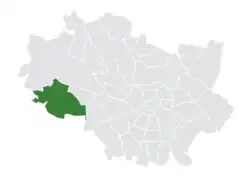Jerzmanowo-Jarnołtów-Strachowice-Osiniec | |
|---|---|
 | |
 Location of the district within Wrocław | |
| Country | |
| Voivodeship | Lower Silesian |
| County/City | Wrocław |
| Established | 1991 |
| Population (2022) | |
| • Total | 2,202 |
| [1] | |
| Time zone | UTC+1 (CET) |
| • Summer (DST) | UTC+2 (CEST) |
| Area code | +48 71 |
| Website | Osiedle Jerzmanowo-Jarnołtów-Strachowice-Osiniec |
Jerzmanowo-Jarnołtów-Strachowice-Osiniec (Polish pronunciation: [jɛʐmaˈnɔvɔ jarˈnɔwtuf straxɔˈvit͡sɛ ɔˈɕiɲɛt͡s]) is a district in Wrocław located in the western part of the city. It was established in the territory of the former Fabryczna district.
Background
The district includes the area of four former villages incorporated to the city on January 1, 1973, that is Jerzmanowo (German: Herrmannsdorf), Jarnołtów (German: Arnoldsmühle), Strachowice (German: Strachwitz), and Osinec (German: Kaltasche). Its neighboring districts are Leśnica, Żerniki and Muchobór Wielki.
In 1991, after reforms in the administrative division of Wrocław, it became one of the city's 48 districts.[2] From 1991 until 1997, the settlement was called Jerzmanowo-Jarnołtów-Strachowice.[3]
The district is the location of Copernicus Airport Wrocław.
History
Strachowice
Strachowice dates back to medieval Piast-ruled Poland. The oldest known mention of the village comes from a document from 1305.[4] Its name is of Polish origin, and comes from the Polish word 'strach' ('fear').
In 1937, during a massive Nazi campaign of renaming of placenames, it was renamed to Schöngarten to erase traces of Polish origin. During World War II, the Germans operated the E182 forced labor subcamp of the Stalag VIII-B/344 prisoner-of-war camp in the settlement.[5] Following the defeat of Germany in the war, in 1945, the village became again part of Poland and its historic name was restored.
In 1973, Strachowice was included in the city limits of Wrocław.[4] Until 1990 it was a neighborhood (osiedle) in the south-western part of Wrocław, in the district of Fabryczna. Since 1991, it has been a part of the district.
Climate
| Climate data for Wrocław (Copernicus Airport Wrocław), elevation: 120 m, 1961-1990 normals and extremes | |||||||||||||
|---|---|---|---|---|---|---|---|---|---|---|---|---|---|
| Month | Jan | Feb | Mar | Apr | May | Jun | Jul | Aug | Sep | Oct | Nov | Dec | Year |
| Record high °C (°F) | 14.9 (58.8) |
19.7 (67.5) |
25.2 (77.4) |
29.5 (85.1) |
31.0 (87.8) |
32.8 (91.0) |
36.2 (97.2) |
35.0 (95.0) |
31.8 (89.2) |
28.1 (82.6) |
20.6 (69.1) |
16.4 (61.5) |
36.2 (97.2) |
| Mean daily maximum °C (°F) | 1.3 (34.3) |
3.2 (37.8) |
7.9 (46.2) |
13.6 (56.5) |
18.8 (65.8) |
22.0 (71.6) |
23.4 (74.1) |
23.2 (73.8) |
19.3 (66.7) |
14.1 (57.4) |
7.4 (45.3) |
3.0 (37.4) |
13.1 (55.6) |
| Daily mean °C (°F) | −1.8 (28.8) |
−0.5 (31.1) |
3.2 (37.8) |
8.0 (46.4) |
13.1 (55.6) |
16.5 (61.7) |
17.7 (63.9) |
17.2 (63.0) |
13.4 (56.1) |
8.9 (48.0) |
3.9 (39.0) |
0.2 (32.4) |
8.3 (47.0) |
| Mean daily minimum °C (°F) | −5.3 (22.5) |
−4.0 (24.8) |
−0.9 (30.4) |
2.8 (37.0) |
7.1 (44.8) |
10.7 (51.3) |
12.0 (53.6) |
11.6 (52.9) |
8.7 (47.7) |
4.6 (40.3) |
0.6 (33.1) |
−3.1 (26.4) |
3.7 (38.7) |
| Record low °C (°F) | −30.0 (−22.0) |
−27.0 (−16.6) |
−23.8 (−10.8) |
−8.1 (17.4) |
−4.0 (24.8) |
0.2 (32.4) |
3.6 (38.5) |
2.1 (35.8) |
−3.0 (26.6) |
−7.6 (18.3) |
−18.2 (−0.8) |
−24.4 (−11.9) |
−30.0 (−22.0) |
| Average precipitation mm (inches) | 28 (1.1) |
26 (1.0) |
26 (1.0) |
39 (1.5) |
64 (2.5) |
80 (3.1) |
84 (3.3) |
78 (3.1) |
48 (1.9) |
40 (1.6) |
43 (1.7) |
34 (1.3) |
590 (23.1) |
| Average precipitation days (≥ 1.0 mm) | 7.3 | 6.6 | 7.2 | 7.7 | 9.6 | 10.0 | 9.7 | 8.4 | 7.9 | 7.1 | 9.2 | 8.6 | 99.3 |
| Mean monthly sunshine hours | 49.0 | 65.0 | 107.0 | 142.0 | 198.0 | 194.0 | 205.0 | 197.0 | 139.0 | 108.0 | 52.0 | 39.0 | 1,495 |
| Source: NOAA[6] | |||||||||||||
References
- ↑ "Liczba mieszkańców zameldowanych we Wrocławiu w podziale na Osiedla – stan na 31 grudnia 2022 r."
{{cite web}}: CS1 maint: url-status (link) - ↑ "UCHWAŁA NR XX/110/91 RADY MIEJSKIEJ WROCŁAWIA z dnia 20 marca 1991 roku w sprawie podziału Wrocławia na osiedla".
- ↑ "Baza Aktów Własnych". baw.um.wroc.pl. Retrieved 2024-01-02.
- 1 2 Antkowiak, Zygmunt (1991). Wrocław od A do Z. Wrocław-Warszawa-Kraków: Ossolineum. p. 313. ISBN 83-04-03723-8.
Strachowice, osiedle w dzielnicy Fabrycznej, wzmiankowane po raz pierwszy w 1305 r. Zapis z 1330 r. stwierdza, iż w Stachowicach znajdował się "dwór, czyli folwark", do którego należało 7 morgów ziemi. W 1345 r. Zygfryd z Żyrowa otrzymał w Strachowicach 8 łanów za roczny czynsz, a ponadto sądy wszelkie służby oraz 6 łanów chłopskich. W tamtych czasach miejscowy folwark był też gródkiem. Wedle Księgi ziemskiej (1353) nie określony bliżej pan Paweł miał we wsi 7 łanów folwarcznych, Mikołaj Żyrowski 5 łanów, a sołtys 2 łany. Przyjaciółka Goethego Karolina von Stein odnotowała, że gdy w 1803 r. była w Strachowicach. miejscowe dziewczęta "śpiewały także polskie pieśni". Pod naporem wojsk radzieckich hitlerowcy oddali Strachowice 16 II 1945 r., tracąc jednocześnie lotnisko wojskowe. Do Wrocławia wieś została przyłączona 1 I 1973 r. Obok starej zabudowy wiejskiej w ostatnim 40-leciu powstało tu trochę domków jednorodzinnych.
- ↑ "Working Parties". Lamsdorf.com. Archived from the original on 29 October 2020. Retrieved 11 November 2021.
- ↑ "Wroclaw(12424) - WMO Weather Station". NOAA. Retrieved December 31, 2018. Archived December 27, 2018, at the Wayback Machine.